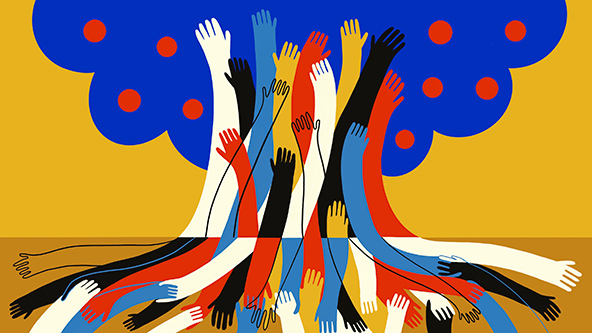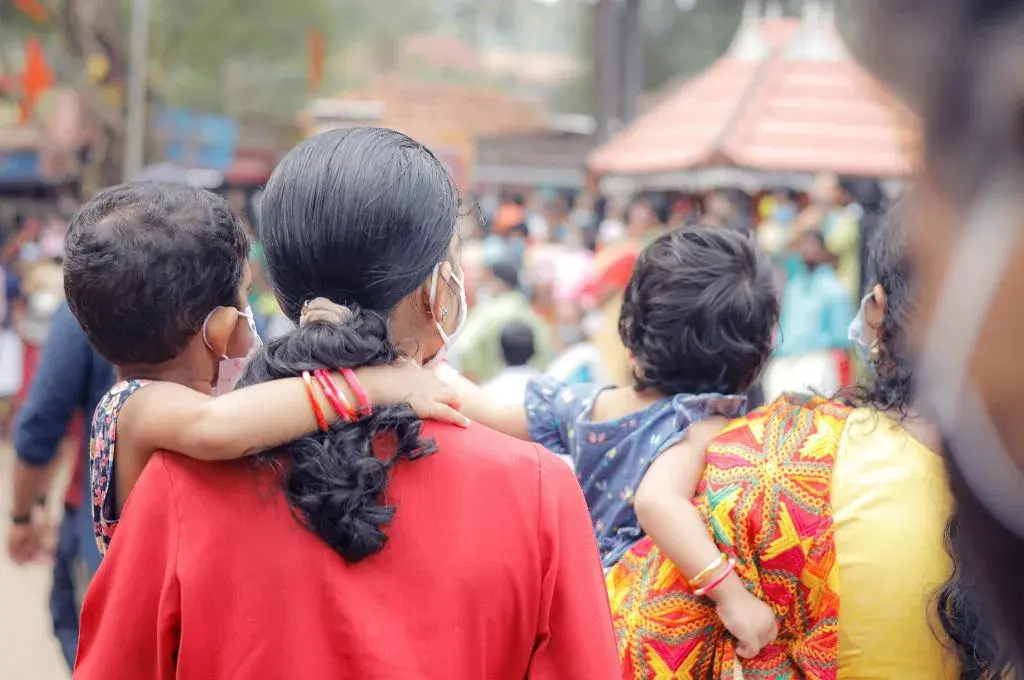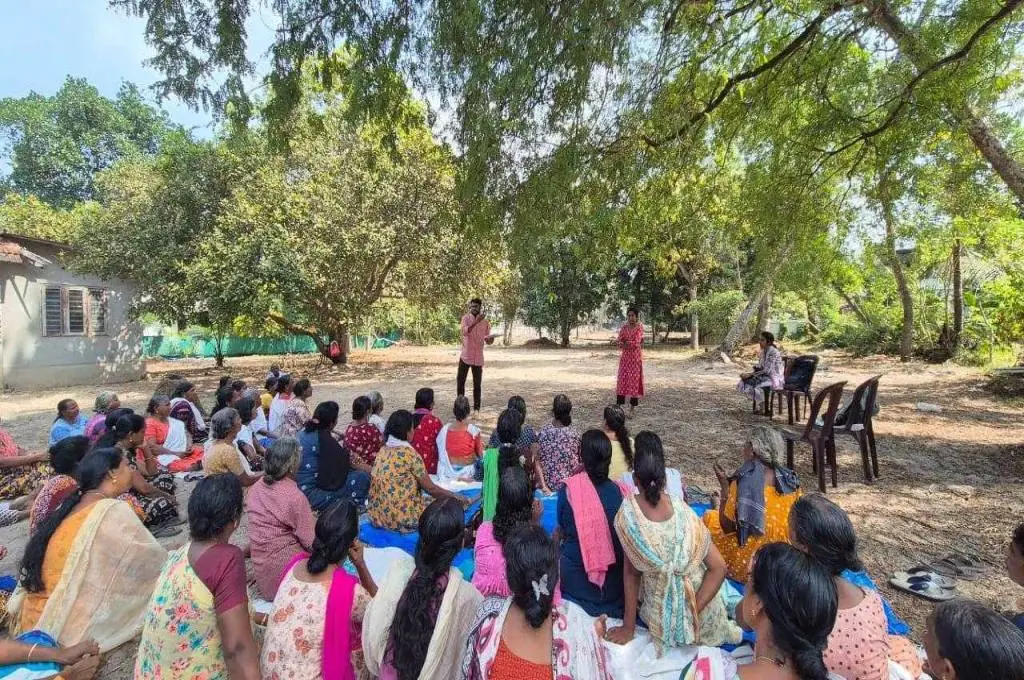Edited transcript of the episode:
0.53
Devanshi: Today we’re talking about what it means to tell the truth in times of crisis or to report on what’s happening in the world, and what that costs. When conflict and catastrophe are making headlines everywhere, what is the emotional toll of covering that? And does it often go unseen? And to do that, we’re going to talk to both of you [Mar Cabra and Nat Kendall-Taylor]. Mar Cabra is a Pulitzer Prize–winning investigative journalist who led technology and data work on the Panama Papers. But after years of intense reporting, [she] burned out and began advocating for mental health in journalism, co-founding The Self-Investigation—a project that supports newsroom well-being. And Nat Kendall-Taylor is a cognitive anthropologist and CEO of FrameWorks Institute, which is a communications think tank based out of the United States. His work focuses on how the media frames complex social issues, from migration to violence, and how these narratives shape what the public understands, feels, and believes is possible.

Together I’m hoping that you are going to help us understand: Can the media inform without causing harm—whether that is harm to their audiences or to the people who are doing the informing—and how do we, in today’s day and age, hold space for both truth but also for care? We can just [begin] with your own relationship to this work, Mar. I’m going to ask you what covering the Panama Papers taught you about the personal cost of high-stakes journalism? [Could you also] explain what the Panama Papers were?
02:26
Mar: The Panama Papers was an investigation that was published in 2016 by a group of 400 reporters from all over the world, [who] collaborated in secret over what was then the largest leak-based investigation in journalism history. 11.5 million files exposed the rich and the powerful and [how they were] evading taxes and creating higher inequality in our countries. And there were high level people—from top politicians to soccer players to singers to terrorists—in the papers. And we exposed their names, we changed the way we look at this parallel economy that is being created by the powerful.
And it was one of the most impactful investigations in journalism history. I’m not saying that because I participated in it; it really was. [And] because [of] the power of collaboration. There was impact in pretty much every country that we published in, at so many levels. There was money being recovered in taxes. There were laws being changed for long-lasting impact. And there was also impact at a professional level. We won many awards, including the Pulitzer Prize. I was a Spaniard in my early 30s. I would have never, ever imagined I would have [won] a Pulitzer Prize. And I thought that would be the top of my career and the highest point in my life.
And it was the top of my career, but not the highest point in my life. It was one of the lowest points in my personal life.

if you don’t take care of yourself, your body, your mind, your emotions are going to stop you at some point.
I felt exhausted physically and emotionally. I hated my job. I was very negative. I just didn’t want to do what I had been doing for so many years any more. And I thought there was something wrong with me. I thought I was missing something that the others had and I didn’t. In reality, what had happened to me is that I had burned, and burnout causes all those things: negativity, chronic stress built over time, chronic exhaustion, detachment. All those [things] were signs that I had gone too far. So, to me, the Panama Papers had this other lesson that if you don’t take care of yourself, your body, your mind, your emotions are going to stop you at some point. And I’m very grateful actually that my body stopped me, so that I can now learn how to do this very important task of being a journalist, of telling the truth, or at least trying to make sense of this complex world in a healthier way.
We need to be well to do our jobs and we need to put ourselves first.
05:22
Devanshi: Nat, how do you think that media exposure to conflict…and there is a lot of conflict happening around the world today…how does it impact the public’s emotional response, cognitive response, and also their belief that they can take action or do anything about it?
05:39
Nat: The work that I do is very different from the work that [Mar does]. I’ve never won a Pulitzer. And yeah, I am considering whether I have burnout after hearing about those symptoms.
05:49
Devanshi: I was going to say at least you didn’t burn out.
05:51
Nat: I’ll go back to that maybe at the end and I’ll be a little self-reflective after this.
I study how the information that people receive affects how they think about issues, how they feel about issues, and how they act on issues. And I am part of an organisation that conducts research investigating those thoughts, feelings, [and] responses. And a lot of our work is around dominant presentation that people receive during crisis, emergency, [and] catastrophe. These are real, urgent issues. We do a lot of work on immigration, on public health, and on criminal legal reform. And those are issues that factually are urgent and dire. But what we find is that presenting those issues persistently as crises, as on fire, as the next thing that’s going to drop out of the sky doesn’t have the intended effect that we as communicators want to have when we present urgency in crisis, which is to motivate and engage people—to get people to realise that these issues are real, they’re urgent, they’re being felt and experienced, and they require action. What ends up happening instead—and there’s a lot of work that’s been conducted on this outside of my organisation—is that when presented with an endless stream of crisis, crisis, crisis, and emergency, emergency, emergency, people’s response is to turn it off and tune out.
[For example,] the youth mental health crisis becomes yet another crisis that I know about, but that I know nothing [to] do about. And therefore, I put it on the pile of other big, bad, dire, and on-fire social issues that I know are there, but [that I don’t know what to do] about.
The progressive advocates we work with are experts at crisis and emergency and have realised [that] telling people how bad an issue is does not [create] change, and actually backfires [and] makes people less engaged and less willing to participate. This kind of emergency inflation and crisis fatigue is increasingly being experienced across a wide range of issues. And I think the really interesting question…and I’m not so interested in whether that happens or not [as] I’m pretty confident that it [does] happen…the more interesting question is, what can we do about it?
And there’s quite an elegant solution, which is solutions. That if we can present messages that clearly establish an urgency and the gravity of a situation, [which is] what pulls people in, but balance that with an equal sense of hope, that positive outcomes are possible, that we know about solutions, that they exist in places, and communities are doing them and they result in these outcomes. So, this balance between a sense of crisis or urgency and a sense of efficacy or solutions. [This is a] magical combination that pulls people in, gives them a place to go, and [helps them] tune out that sense of paralysis that results from an endless stream of issues that we are up against.
09:17
Devanshi: Correct me if I’m wrong, but that kind of reporting [which is a] mix of urgent but [with] solutions would be slower and perhaps less [like] breaking news. What happens in India is the same visuals [are shown] over and over again of terrible things that are going on. So, if we were to talk about balancing urgency and accuracy—which as journalists we are striving to do—with care, both inside the newsroom and for the messaging that we use and we put out, what would that look like?
09:57
Nat: I’m not a journalist. I should be very candid about that. I work with some and know some. And I know that there is a vein or a stream within journalism that’s really interested in the accountability and responsibility that journalists have for the way that issues are framed. I’ve had a lot of conversations with journalists who think that their job is just to present the truth. And my position in those conversations has been an unpopular one. You’re always framing an issue. The decisions that you make about the way that you position these issues has an impact. And increasingly, over the last 10 years, a lot of journalists have maybe moved from this ‘I just present the facts’ [view] to a sense of accountability and responsibility in the stories that [they] tell.
And I think that accountability is to the audiences with whom journalists communicate. It’s also to the field of journalism. I don’t think it’s a hard pitch to make that journalists and their stories do more than just convey the truth. They shape how people understand issues, how people respond to them. And my biggest wish is to collaborate more with journalists on the work that we do [at FrameWorks Institute] on mindsets and narratives, and what we [have discovered] about the decisions that we make and how we say what we say [and how it influences things]. We [can] bring some of that into journalistic practice as a way that adds value and is obviously respectful to the incredible expertise that journalists bring to that endeavour as well.
11:31
Mar: And I wish you success with that because we need that knowledge, evidence-based knowledge on what works. And there’s a big crisis in journalism. We are an industry that is dying. There’s a business model in decline. People don’t trust journalists and the media any tmore. We need to acknowledge that that’s the reality. A lot of my colleagues are working in very precarious conditions and are doing what they can with very little resources. However, the moments of crisis always bring interesting change. It’s important to understand that we need to heal the industry. And we need to look at news in a different way. [We need to look at] how we produce them and how we treat the people we work with. It’s two different sides, right? There’s also a lot of conversation in journalism around trauma-informed reporting. I used to be a TV journalist at the beginning of my career and I would be with my microphone running around asking people very quick questions, and I just wanted them to say what my bosses told me we needed for TV.
I didn’t give care back then. I just wanted the quote and [then I would get] out instead of [asking them] what [they] want to say. And this [asking people what they want and showing up with care] is key, especially in situations where there’s been a crisis or a conflict, where there’s been violence. In Spain recently we had a big disaster, the biggest natural disaster in our history, which was a flood where dozens of people died. And I saw a lot of my colleagues just going around asking people who had lost everything for that quote and then leaving them hanging after they had poured their heart out, leaving them hanging without the lights of the TV and the camera crew. We cannot do that to people.
We need to get trained [on] how to deal with potential traumatic situations. We need to get trained [on] how to deal with hate.
These types of situations also do harm to the journalists who are reporting. And I think that we need to get trained [on] how to deal with potential traumatic situations. We need to get trained [on] how to deal with hate. Journalists are at the centre of every hateful message right now. And we don’t get training on that. We’re like firefighters. We’re like frontline responders. And that’s why I co-founded a nonprofit called The Self-Investigation that supports journalists to deal with their mental health challenges, and to be prepared to deal with these very complex situations. The reason I’m talking about that now is that imagine these very stressed individuals. [These are] journalists working under precarious conditions, under a lot of pressure, [and are constantly] exposed to potentially traumatic imagery, either on the ground or online. They then have to tell the world, “Oh, I’m going to make sense of this complex world we live in, and this is the story.” It is very difficult to do that. We’re not superhuman. We’re human beings. So to me, one of the most insightful quotes that I’ve ever heard comes from mindfulness. It’s from Victor Frankl, who is a Holocaust survivor. It says, between stimulus and response, there’s a space. The wider that space is, the more chance we’ll have to respond from a place of choice and not just from reactivity. Right now, in journalism, that space is nothing. So, we also need to start widening the space. [Nat was] talking about balance, not always breaking [news]. If you’re doing breaking news, [that] space is zero. And we need to balance that as well. And it’s not as easy as you put it. I hope editors listen to you but we are used [to] story after story after story after story, clickbait. And we also need to change what we think works, which is not what really works.
15:34
Nat: I’m interested in exactly what you [have] landed on. It’s great to say [that] people shouldn’t [have the] ‘if it bleeds, it leads’ [approach]. But there’s not only norms and practices, there’s incentives, right? A lot of journalists I’ve spoken to say that it’s great [that you are] talking about solutions. But I am incentivised. I have a job in which I have to present messages in a certain way because that’s what sells. And so, I’m interested in [knowing] how we are changing that. It’s not just norms and practices. It’s a structure. It is a system that is set up to incentivise certain stories and make other stories, even if they work, really hard to tell and sell. So, how do we do that?
16:23
Mar: We need a systemic change, both at the journalism or media level [as well as] in terms of society. We need to be able to click on [balanced] stories more. Just know that if we click on those stories more, we are giving them an argument to do more of those stories. I mean, there’s so many examples that this is what people are hungry for.
16:49
Devanshi: Is there a story or a moment that you have seen framed the way that you would like [it] to be framed: more solutions-oriented, less clickbait, less breaking news? Can you tell us about it? Does something come to mind?
17:05
Mar: I’m going to mention an example about something very simple, which is digital overwhelm. I don’t know one person in the world that doesn’t feel digital overwhelm. This is my default topic at dinners. And because we’re [on] our phone [it’s almost like] what do we do? [There are] so many messages, and the same message through three different channels. And so The Guardian did a newsletter about how to mitigate digital overwhelm, [and] how to have a healthy relationship with [your] own devices. And instantly, within days, that became the most-read product [on] The Guardian. So we [realised] people really want to know how to deal with their phones. So that’s the example that comes to mind.
17:59
Nat: Most of my examples come from advocate storytelling, and activists and organisers who have made deliberate decisions to tell stories [in an] ethical [way by] not putting people [in uncomfortable situations or making them] do things that they don’t want to do, which [might make] them re-experience harm.
I’ve done a lot of work on early childhood development and how science from early childhood development can make its way into policymaking, decision-making, and public audiences. And I think that from the beginning…I’ve been doing this work for 20 years…they’ve been really careful [about] not feeding into crisis inflation and emergency fatigue. And they always have this set of how-tos [and] things to think about. [This is an] example of communities that are doing things. And it’s compulsory when they talk about a problem—of which there are many—whether it’s childcare or youth mental health, they are just unwilling to have that conversation unless they can get some of those solutions mapped on as well. It’s become habit for them, that I cannot talk about how bad things are and leave people there. I must give people a place to go. I must give people concrete examples of good stuff being done in particular communities that is having positive results and outcomes. And it is irresponsible for me to do one without [the other].
19:28
Mar: You’re making me think of this documentary, The Social Dilemma, that was on Netflix. It interviews some former employees of tech companies about [how these] companies are creating tech, especially social media companies. [They are creating tech] that is addictive or that [builds] some sort of incentives for addiction. And what I really liked about that is [that] the documentary had a campaign parallel to [it]. If you went to the website [it would tell you] what [you] can do to make your devices less addictive, what you [can] do to hold tech companies [accountable], what you can do to actually hold a viewing of this documentary in your community. It gave you different entry points, depending on what you want it to do, to take action.
One of the problems that the media is having right now is a lot of the young journalists, they’re saying I don’t want to do this. I want to have, you know, make the world a better place, and you’re just saying what’s happening, you know? And that’s also why influencers are becoming so successful. Many times they speak from the heart, they speak from their own personal experience when traditional journalists have been told, don’t immerse yourself in the story, say things in the third voice, you know? Which I think makes sense in many ways, but in some other ways [does] not. And that’s why I speak up about my own challenges with mental health. And that’s why I say, “Hey, I had depression.” “Hey, I had burned out.” And, you know, you can have a Pulitzer Prize and burn out and you can, you know, then recover after that and you can continue with your life. And, I think, you know, we need to be able to speak up more from where we are at. The opposite of fear is hope. So that’s how we counteract the fear that is being spread around.
21:19
Devanshi: Thank you for that. If you could change one thing, however small, like a tangible, practical thing, not a system, in how people tell stories or how we train journalists, what would that be?
21:32
Mar: I would tell every journalist out there and every content creator, everybody who [is] telling stories that you have a big responsibility, therefore make sure you take care of yourself so that you can show up in your best version to others.
21:51
Nat: Mine is the same up until halfway through that sentence. Not just journalists but [also] people who make things that real people actually watch is that your job obviously has an entertainment component. You are trying to tell good stories, but you also have a responsibility for the larger environment in which people are making decisions and understanding issues. And it’s not just telling the truth or telling a good story, but there is ethics and a responsibility to that storytelling. And that would be the one thing that I would want people to know, that how you say what you have to say is incredibly important. It can be the difference between emergency inflation and crisis fatigue, and people turning away and tuning out and losing faith in vital institutions like journalism, and being hopeful and realising and thinking that there are things that can be done that would make this world and the issues that we care about better.
—
Read more:
- How journalists can hold algorithms accountable in India and beyond
- TV coverage of the conflict is rage bait masquerading as news. How did India get here?
- News in India is being erased from the internet
- What do people think of climate news?
- ‘Exhausted, hungry, and scared’: What it’s like to be a journalist in Gaza
- Solutions Journalism: What is it and why should I care?





